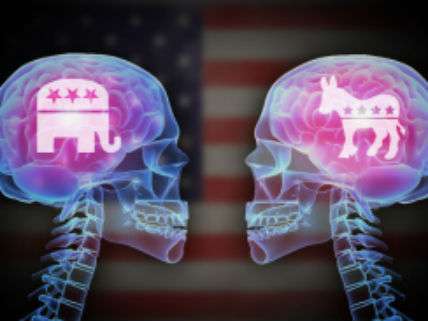Liberals Are Simple-Minded
...and often more dogmatic than conservatives, according to a new study.

It is almost a truism among psychological researchers that conservatives are simple-minded and dogmatic. Liberals, meanwhile, are supposed to be more complex and open-minded thinkers. But a new paper is calling those conclusions into question.
Writing in the journal Political Psychology, a team of researchers led by the University of Montana psychologist Lucian Gideon Conway III reports the results of four studies that together call "into question the typical interpretation that conservatives are less complex than liberals." It turns out that liberals and conservatives are both simple-minded, depending on the topic under discussion.
Using the dogmatism scale devised in 1960 by the psychologist Milton Rokeach, who defined dogmatism in terms of "closed belief systems," researchers have generally found a positive relationship between dogmatism and political conservatism. But while the Rokeach scale is supposed to be politically neutral, Conway and his colleagues argue that it actually includes a number of topics for which conservatives generally have a greater concern, such as religion and national defense. Conservatives who fill out the scale would more tend to come off as more dogmatic largely because they are endorsing conservative views.
So for their first study, Conway and his colleagues modified the Rokeach dogmatism scale by including items reflecting alternatively environmentalist and religious views. For example, item 7 reads alternatively: "When it comes to differences of opinion in protecting the environment/religion we must be careful not to compromise with those who believe differently from the way we do."
Several hundred undergraduates (the traditional psych lab rats) filled out questionnaires that sorted them using a 7-point scale along the usual American bipolar liberal-conservative political continuum. They then administered the standard Rokeach scale along with their modified versions. Sure enough, the standard dogmatism test found conservatives to be more dogmatic than liberals. Once again, conservatives are simpleminded ideologues. Or are they?
Comparing the religion-dogmatism scale with the regular Rokeach scale, the researchers found essentially no differences in conservative dogmatism on either scale. This strongly bolsters the claim that Rokeach dogmatism scale is biased toward finding conservatives dogmatic.
The more interesting and telling results were found when comparing the liberal and conservative results derived from the environmentalism and religion dogmatism scales. The researchers report, "Conservatives are indeed more dogmatic on the religious domain; but liberals are more dogmatic on the environmental domain." In fact, they note that "the highest score for simplicity was for liberals" (emphasis theirs).
They note that liberals scored high for dogmatism in response to these three items:
9. There are two kinds of people in this world: those who are for the truth that the planet is warming and those who are against that obvious truth.
3. When it comes to stopping global warming, it is better to be a dead hero than a live coward.
10. A person who thinks primarily of his/her own happiness, and in so doing disregards the health of the environment (for example, trees and other animals), is beneath contempt.
The researchers point out, "Those are not just statements about having an environmental position: They are explicitly and overwhelmingly dogmatic statements. And liberals are more likely to agree with such sentiments—for an environmental domain." The liberal respondents are not just asserting "'I am an environmentalist' but rather 'all people who disagree with me are fools.'"
Conway and his colleagues also discuss the results of three other studies that try to compare the integrative complexity of liberal and conservative thought processes. Integrative complexity is the degree to which individuals consider divergent perspectives and take into account the connections between them. Again, most psychological research finds that conservatives are less able and less willing to think about issues from different points of view.
In one study, the researchers analyzed the responses of nearly 1,500 undergraduates sorted along the usual liberal-conservative continuum to a questionnaire asking them to think about various social and political issues. Their answers were then coded for integrative complexity and compared. It turns out that conservatives showed more complexity when dealing with topics like the death penalty, socialism, and refugees. Liberal responses were more complex when considering pre-marital sex, biblical truth, and alcohol. Overall, they report that liberals showed no greater complexity in thinking than conservatives did.
A similar study analyzed liberal and conservative responses to a 30-item questionnaire. Again, conservatives exhibited more complex thinking on some topics, including open-door immigration, smoking, castration, and easy access to birth control. Liberals were complex when discussing organized religion, abortion on demand, making racial discrimination illegal, and being assertive.
The researchers also found that both liberals and conservatives hold stronger attitudes for the topics on which they are more simple-minded.
Their final study analyzed the integrative complexity of arguments on 15 different topics made by President George W. Bush and his Democratic rival, John Kerry, during 2004's presidential debates. They randomly selected five paragraphs on each topic from the candidates. The results are that Bush expressed more complex thinking than Kerry on religion, terrorism, stem cells, health care, and affirmative action. Kerry, on the other hand, was complex than Bush on Iraq, general foreign policy, economic issues, abortion, and education.
Ultimately, the researchers report that both liberals and conservatives are almost equally simple-minded when it comes to topics about which they feel strongly. On the basis of their studies, Conway and his colleagues conclude, "It may be that liberals are, as many have claimed…pulled towards complexity more than conservatives: But we think such a judgment is premature."
Disclosure: As an open-to-experience libertarian with a high need-for-cognition, I have no dogmatic views, only well-informed ones.

Show Comments (234)